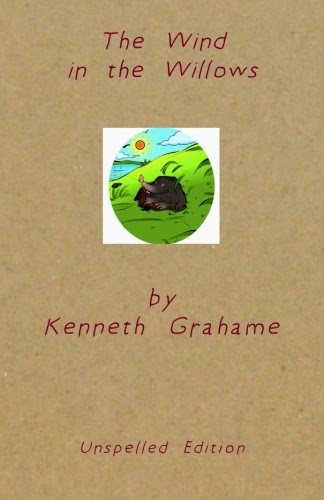I am very happy to announce that the first Unspelled Edition of a children's classic is finally out, so please go ahead and order it. This book, being the first, took 2.5 years to produce. The second (containing both Alice's Adventures in Wonderland and Beyond the Looking-Glass) took 2.5 days. The third (Treasure Island) is taking about a day. The tenth, I suspect, will take less than an hour. That's how it works with software: it takes a long time to get all the bugs out, but once they are gone it becomes more or less a matter of pushing a button.
I also unspelled Winnie the Pooh and All, All, All, only to realize that the copyright on it and everything else Pooh-related is owned by Disney and won't expire until 2026. So, either Disney gives me permission (they take up to eight weeks to give a “Yes” or a “No”) or it has to wait until 2026. Or I could get sued by Disney (since they sue everyone) and win. Don't laugh. You see, in the June 10, 2014 decision, the United States Court of Appeals for the Second Circuit in Authors Guild, et al. vs. HathiTrust, held that libraries need not rely on the provisions of copyright law relating specifically to access by the disabled in order to provide access to their collections for print-disabled readers. This decision allows copyrighted content to be available in Braille for the blind. By an exact analogy, it also ought to allow copyrighted content to be made available in Unspell for the dyslexics, who can likewise be characterized as “print-disabled.” In addition, Unspell qualifies as a fair use of the original content, being 1. a significant, unidirectional transformation of the original text that 2. cannot possibly be shown to be in competition with its publication in its original form; and is 3. a significant abridgement of the original text, since unspelled text contains fewer letters than the same spelled text.
But since there is a huge number of copyright-free titles available for me to unspell, why would I want to waste my time on legal battles? Quite the opposite: content owners should want to have their content published in unspelled form, in order to tap into a new market.
In any case, Project Unspell is now up and running: there is a reading primer for learning it, and at least one unspelled title available for purchase with many more in the pipeline.
I also unspelled Winnie the Pooh and All, All, All, only to realize that the copyright on it and everything else Pooh-related is owned by Disney and won't expire until 2026. So, either Disney gives me permission (they take up to eight weeks to give a “Yes” or a “No”) or it has to wait until 2026. Or I could get sued by Disney (since they sue everyone) and win. Don't laugh. You see, in the June 10, 2014 decision, the United States Court of Appeals for the Second Circuit in Authors Guild, et al. vs. HathiTrust, held that libraries need not rely on the provisions of copyright law relating specifically to access by the disabled in order to provide access to their collections for print-disabled readers. This decision allows copyrighted content to be available in Braille for the blind. By an exact analogy, it also ought to allow copyrighted content to be made available in Unspell for the dyslexics, who can likewise be characterized as “print-disabled.” In addition, Unspell qualifies as a fair use of the original content, being 1. a significant, unidirectional transformation of the original text that 2. cannot possibly be shown to be in competition with its publication in its original form; and is 3. a significant abridgement of the original text, since unspelled text contains fewer letters than the same spelled text.
But since there is a huge number of copyright-free titles available for me to unspell, why would I want to waste my time on legal battles? Quite the opposite: content owners should want to have their content published in unspelled form, in order to tap into a new market.
In any case, Project Unspell is now up and running: there is a reading primer for learning it, and at least one unspelled title available for purchase with many more in the pipeline.


3 comments:
I commend your taste!
Consider the Disney lawsuit like an advertising expense. Sony ditched the North Korea movie after the hack to collect the insurance, and now because of the controversy everyone wants to see it. Not sure how the numbers work out, but something tells me they are going to be better off than if it hit the theaters. Anyway, when taking a publicity route that involves lawyers your mileage may vary.
To answer a question that has come up: I was not able to produce unspelled editions with spelled English subtitles under each word for 3 reasons:
1. It would have made the books too long and fat, and therefore too expensive.
2. It would have meant entering into competition with existing publishers, putting me in their cross-hairs as far as any copyright I might infringe on.
3. It was technically too difficult as a typesetting exercise, requiring some new technology to be invented.
I may still put out subtitled editions in HTML form, since that's much easier technically, and "taking it down" if someone threatens to sue is a trivial exercise.
Post a Comment